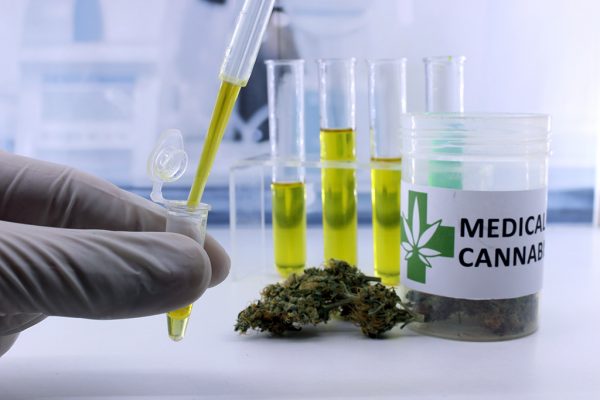Looking to take his business portfolio to new heights, a prominent local real estate developer is backing an effort to bring one of the state’s first medical cannabis dispensaries to Richmond.
Fountainhead Properties’ Tom Papa said he’s working with a group that’s vying for one of the five licenses the state’s Board of Pharmacy will grant allowing for medical cannabinol (CBD) oil dispensaries to be established in each of the commonwealth’s five health service areas.
The operation, if approved, would be “somewhere in south Richmond,” Papa said, without disclosing a specific location or amount of investment.
“My hope is to bring it to a part of Richmond where it results in high-paying jobs, and meets the demand of people who really need this product in their day-to-day lives,” Papa said. “We think it will be a very good fit.”
Should it win the license, the group Papa is involved with would be the lone cannabis oil dispensary in Health Service Area 4, which encompasses 27 counties and six cities, including Henrico, Chesterfield and Hanover counties; and the cities of Richmond, Petersburg, Hopewell and Colonial Heights.
Diane Powers, spokeswoman for the Virginia Department of Health Professions, said the state is considering nine applications for Area 4, of which Papa’s group is one.
Statewide, there are 51 applicants vying for one of the five licenses.
The Board of Pharmacy had been set to make its decision on the five dispensary locations this month, Powers said, but the board pushed back the date to this fall because of application volume.
The state is not publicly releasing specifics of the submitted applications, Powers said, since each contains proprietary information. Papa also would not identify those he’s involved with.
The application process was opened up after the passage earlier this year of House Bill 1251, which allows for a wide swath of patients in Virginia to use CBD – one of 104 chemical compounds found in the marijuana plant – if properly prescribed by a physician.
Previous state law allowed the oils, which are non-hallucinogenic, to be used only for Virginians suffering from intractable epilepsy.
The bill, which Gov. Ralph Northam signed into law on March 9, also called for the establishment of the five medical cannabis oil dispensaries, or pharmaceutical processors, to manufacture the product throughout the state’s health services areas. The oils are consumed orally and topically.
The licensees approved by the state’s pharmacy board will have a year to get their staff in place and establish a timeline for the construction or remodeling of an existing building for their facilities.
The awarded entities must have the dispensary operational 180 days from notification. If the timeline is not met, the board may rescind the applicant’s permit – unless such delays were caused by circumstances beyond their control.
If the original applicant is unable to establish a dispensary in the service area, the board will review other qualified applicants for the service, or publish a public notice for open applications for that permit.
Much of the zoning necessary for the medical cannabis oil dispensaries will be completed at the local level, Powers said, although the law states they cannot set up within 1,000 feet of a school or daycare.
While there are no minimum or maximum size requirements for the dispensary operation, Powers said the cultivation of the marijuana plants, production of the oils and dispensing must occur from the same site. The dispensary operations are not allowed to wholesale their harvest to anyone.
A medical cannabis oil dispensary would be a different path for Papa, who’s known more for his residential and mixed-use developments around Richmond.
But the long-time developer said he sees the dispensary operation as an economic-development opportunity for the city and region – one that could have long-lasting effects on the area’s medical research and development, and tech startup sectors.
Aside from the potential economic benefits a dispensary could have on the region and city, Papa said he’s also encouraged by the medical benefits cannabis oil is bringing to those dealing with neurological disorders.
“It’s a very useful medication,” Papa said. “The potential growth of these types of services is great, and expanding.”
Looking to take his business portfolio to new heights, a prominent local real estate developer is backing an effort to bring one of the state’s first medical cannabis dispensaries to Richmond.
Fountainhead Properties’ Tom Papa said he’s working with a group that’s vying for one of the five licenses the state’s Board of Pharmacy will grant allowing for medical cannabinol (CBD) oil dispensaries to be established in each of the commonwealth’s five health service areas.
The operation, if approved, would be “somewhere in south Richmond,” Papa said, without disclosing a specific location or amount of investment.
“My hope is to bring it to a part of Richmond where it results in high-paying jobs, and meets the demand of people who really need this product in their day-to-day lives,” Papa said. “We think it will be a very good fit.”
Should it win the license, the group Papa is involved with would be the lone cannabis oil dispensary in Health Service Area 4, which encompasses 27 counties and six cities, including Henrico, Chesterfield and Hanover counties; and the cities of Richmond, Petersburg, Hopewell and Colonial Heights.
Diane Powers, spokeswoman for the Virginia Department of Health Professions, said the state is considering nine applications for Area 4, of which Papa’s group is one.
Statewide, there are 51 applicants vying for one of the five licenses.
The Board of Pharmacy had been set to make its decision on the five dispensary locations this month, Powers said, but the board pushed back the date to this fall because of application volume.
The state is not publicly releasing specifics of the submitted applications, Powers said, since each contains proprietary information. Papa also would not identify those he’s involved with.
The application process was opened up after the passage earlier this year of House Bill 1251, which allows for a wide swath of patients in Virginia to use CBD – one of 104 chemical compounds found in the marijuana plant – if properly prescribed by a physician.
Previous state law allowed the oils, which are non-hallucinogenic, to be used only for Virginians suffering from intractable epilepsy.
The bill, which Gov. Ralph Northam signed into law on March 9, also called for the establishment of the five medical cannabis oil dispensaries, or pharmaceutical processors, to manufacture the product throughout the state’s health services areas. The oils are consumed orally and topically.
The licensees approved by the state’s pharmacy board will have a year to get their staff in place and establish a timeline for the construction or remodeling of an existing building for their facilities.
The awarded entities must have the dispensary operational 180 days from notification. If the timeline is not met, the board may rescind the applicant’s permit – unless such delays were caused by circumstances beyond their control.
If the original applicant is unable to establish a dispensary in the service area, the board will review other qualified applicants for the service, or publish a public notice for open applications for that permit.
Much of the zoning necessary for the medical cannabis oil dispensaries will be completed at the local level, Powers said, although the law states they cannot set up within 1,000 feet of a school or daycare.
While there are no minimum or maximum size requirements for the dispensary operation, Powers said the cultivation of the marijuana plants, production of the oils and dispensing must occur from the same site. The dispensary operations are not allowed to wholesale their harvest to anyone.
A medical cannabis oil dispensary would be a different path for Papa, who’s known more for his residential and mixed-use developments around Richmond.
But the long-time developer said he sees the dispensary operation as an economic-development opportunity for the city and region – one that could have long-lasting effects on the area’s medical research and development, and tech startup sectors.
Aside from the potential economic benefits a dispensary could have on the region and city, Papa said he’s also encouraged by the medical benefits cannabis oil is bringing to those dealing with neurological disorders.
“It’s a very useful medication,” Papa said. “The potential growth of these types of services is great, and expanding.”


Its a “new” opportunity, given to those with an inside track.